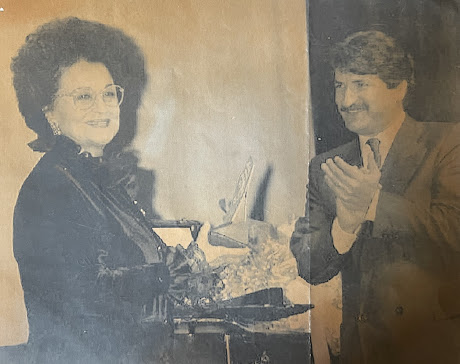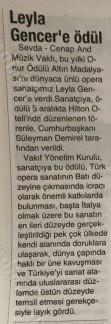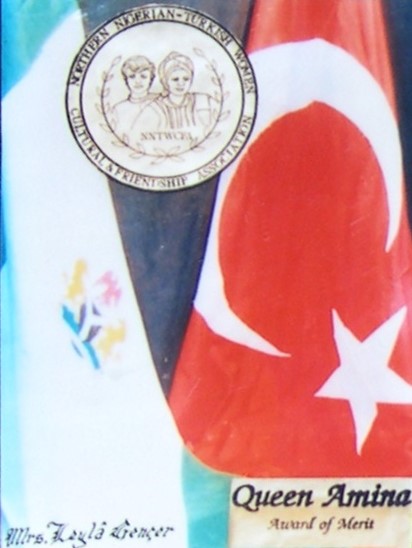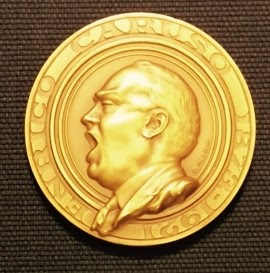
1979: Sandro BOLCHI, Regista; Carlo Alberto CAPPELLI, Sovrintendente Arena di Verona; Renzo CASELLATO, Tenore; Ines CORRAIN, Pittrice Liliana COSI, Ballerina; Rina MALATRASI, Soprano; Maria Teresa MASCHIO, Poetessa; Walter PRONI, Direttore d’Orchestra e pianista; Marinel STEFANESCU, Ballerino; Gianfranca OSTINI, Soprano; Wilma VERNOCCHI, Soprano
1980: Carlo BAGNO, Attore; Piero CAPPUCILLI, Baritono; Roberto MAZZONI, Imprenditore; Valeria MORICONI, Attrice; Magda OLIVIERO, Soprano; Ermanno OLMI, Regista; Piccolo Coro dell’ANTONIANO, Bologna; Mario POMILIO, Scrittore; Rugby ROVIGO, Sport; Uto UGHI, Violinista.
1981: Florindo ANDREOLLI, Tenore; Dino ASCIOLLA, Violista; Pupi AVATI, Regista; Giorgio GASLINI, Pianista; Massimo GRILLANDI, Scrittore; Glauco MAURI, Attore; Liana ORFEI, Attrice e artista circense; Luigi PROIETTI, Attore; Giorgio SAVIANE, Scrittore Luciana SAVIGNANO, Ballerina; Giulietta SIMIONATO, Mezzosoprano; Maria Luisa SPAZIANI, Poetessa
1982: Aurora BANFI, Soubrette; Floriano BODINI, Scultore e pittore Valentina CORTESE, Attrice; Enzo FERRARIS, Direttore d’orchestra e contrabassista; Maria Luisa GASPARETTO MANFREDINI, Docente Economia Politica Università di Padova; Giovanna GUALDI, Scrittrice; Gabriele LAVIA, Regista; Dina LUCE, Giornalista Franco ROSSI, Violoncellista; Nantas SALVALAGGIO, Scrittore Renata TEBALDI, Soprano; Giorgio ZAGNONI, Flautista.
1983: Sirio BANDINI, Pittore; Tino CARRARO, Attore; Giannantonio CIBOTTO, Scrittore; Franco D’ANDREA, Pianista; Carlo DELLE PIANE, Attore; Gabris FERRARI, Pittore; Innocenzo GASPARINI, Economista e Rettore Università Bocconi di Milano; Raina KABAIVANSKA, Soprano; Giulia LAZZARINI, Attrice; Orchestra da Camera di PADOVA; Francesco MOSER, Ciclista; Paolo RIGOLIN, Direttore d’orchestra; Giampietro TINTORI, Direttore Museo Teatro alla Scala di Milano. 1985: Edmonda ALDINI, Attrice; Piero ANGELA, Giornalista Ferruccio BRESOLIN, Docente Commercio Estero Università Cà Foscari; Antonio BRUNI, Autore e dirigente RAI; Renato BRUSON, Tenore; Pasquale FESTA CAMPANILE, Regista; Germano ALFONSI, Scultore e orafo; Bruno GIURIANNA, Direttore d’orchestra e violista; Peter Lukas GRAF, Direttore d’orchestra e flautista; Andrea LUCCHESINI, Pianista; Sandro MUNARI, Pilota di Rally; Francesca OLIVERI, Cantante jazz; Sandro SEQUI, Regista; Antonio SPINOSA, Scrittore.
1986: Claudio ANGELINI, Giornalista; Carlo BATTISTONI, Regista; Pippo BAUDO, Presentatore TV; Mario BONI, Direttore Clinica Ortopedica Università di Pavia; Giuseppe DE RITA, Sociologo; Franco GRAZIOSI, Attore; Marco PIERIN, Ballerino; Loredana RAMAZZOTTI, Istituto Italiano di Cultura in Uruguay; Katia RICCIARELLI, Soprano; Trio di TRIESTE, Musica; Elena ZARESCHI, Attrice.
1988: Danilo AGOSTINI, Preside facoltà di Agraria Università di Padova; Maurizio BELLEZZA, Ballerino; Renata CALDERINI, Ballerina; Michele CAMPANELLA, Pianista; Renato DE CARMINE, Attore; Giuliana DE SIO, Attrice; Claudio MARABINI, Scrittore; Umberto MERLIN, Professore Oculista; Franco PETRACCHI, Contrabassista; Carlo RUBBIA, Fisico; Lucia VALENTINI TERRANI, Mezzosoprano e contralto.
1989: Francesco CASTIELLO, Economista; Italo Alighiero CHIUSANO, Scrittore; Andrè DE LA ROCHE, Coreografo e ballerino; Giancarlo DETTORI, Attore; Rocco FILIPPINI, Violoncellista; Valentina FORTUNATO, Attrice; Giuseppe GIACOMINI, Tenore; Giuliana GIALDRONI GRASSI, Ricercatrice istituto di Tisiologia Università di Pavia; Carlo GRASSI, Direttore Cattedra Malattie Apparato Respiratorio Università di Pavia; Maria CHIARA, Soprano; Giorgio STREHLER, Regista e attore; Nino SURIANI, Imprenditore; Piero TOSO, Violinista; Nina VINCHI GRASSI, Direttrice amministrativa Piccolo Teatro di Milano.
1990: Egnatius Endrik BOTHA, Rugbysta; Mario BRUNELLO, Violoncellista; Pierugo CARBONIN, Direttore Istituto Geriatria Università Cattolica di Roma; Fiorenzo CARPI, Pianista e compositore; Isabelle FAUST, Violinista; Marise FLACH, Mimo; Leyla GENCER, Soprano; Natalia GINZBURG, Scrittrice; Angiolino GRILLINI, Imprenditore; Gheorghe JANCU, Ballerino; Andrea JONASSON, Attrice; Luisa SPINATELLI, Costumista e scenografa; Josef SVOBODA, Regista e scenografo.
1991: Umberto CAPPELLO, Imprenditore; Giancarlo DE STEFANI, Imprenditore; Carlo FONTANA, Sovrintendente Teatro alla Scala di Milano; Ezio FRIGERIO, Costumista e scenografo; Cecilia GASDIA, Soprano; Remo GIRONE, Attore; Nilde JOTTI, Presidente della Camera dei Deputati; Dacia MARAINI, Scrittrice; Franca SQUARCIAPINO, Costumista e scenografa; Giorgio STREHLER, Regista e attore; Maria TIPO, Pianista.
1999: Laura BIAGIOTTI, Stilista; Paolo CHERUBINO, Professore Ordinario di Ortopedia Università Insubria di Varese; Carla FRACCI, Ballerina; Margherita HACK, Astrofisica; Mariangela MELATO, Attrice; Giuseppe MENEGATTI, Regista; Rosanna PURCHIA, Direttrice Piccolo Teatro di Milano; Roberto RUOZZI, Rettore Università Bocconi di Milano; Nello SANTI, Direttore d’Orchestra Ferruccio SOLERI, Attore; Antonio TABUCCHI, Scrittore; Carlo VENTRE, Tenore.
2002: Lodovico AVANZI, Imprenditore; Vincenzo CERAMI, Scrittore; Fiorenza COSSOTTO, Mezzosoprano; Oriella DORELLA, Ballerina; Annamaria GUARNIERI, Attrice; Danilo MAINARDI, Etologo; Anna MARCHESINI, Attrice; Domenico NORDIO, Violinista; Paola PITAGORA, Attrice; Massimo POPOLIZIO, Attore; Lina SASTRI, Attrice












































































































